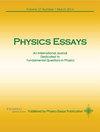The modified fundamental equations of quantum mechanics
IF 0.5
Q4 PHYSICS, MULTIDISCIPLINARY
引用次数: 4
Abstract
The Schrödinger equation, Klein‐Gordon equation (KGE), and Dirac equation are believed to be the fundamental equations of quantum mechanics. Schrödinger’s equation has a defect in that there are no negative kinetic energy (NKE) solutions. Dirac’s equation has positive kinetic energy (PKE) and NKE branches. Both branches should have low-momentum, or nonrelativistic, approximations: One is the Schrödinger equation, and the other is the NKE Schrödinger equation. The KGE has two problems: It is an equation of the second time derivative so that the calculated density is not definitely positive, and it is not a Hamiltonian form. To overcome these problems, the equation should be revised as PKE- and NKE-decoupled KGEs. The fundamental equations of quantum mechanics after the modification have at least two merits. They are unitary in that all contain the first time derivative and are symmetric with respect to PKE and NKE. This reflects the symmetry of the PKE and NKE matters, as well as, in the author’s opinion, the matter and dark matter of our universe. The problems of one-dimensional step potentials are resolved by utilizing the modified fundamental equations for a nonrelativistic particle.修正后的量子力学基本方程
Schrödinger方程、Klein - Gordon方程(KGE)和Dirac方程被认为是量子力学的基本方程。Schrödinger的方程存在一个缺陷,即没有负动能(NKE)解。狄拉克方程具有正动能分支(PKE)和NKE分支。两个分支都应该有低动量或非相对论性的近似:一个是Schrödinger方程,另一个是NKE Schrödinger方程。KGE有两个问题:它是一个二阶导数方程,因此计算出的密度不一定是正的;它不是哈密顿形式。为了克服这些问题,应该将方程修改为PKE和nke解耦的kge。修正后的量子力学基本方程至少有两个优点。它们是酉的,因为它们都包含一阶导数并且对于PKE和NKE是对称的。这反映了PKE和NKE物质的对称性,在作者看来,也反映了我们宇宙中的物质和暗物质。利用修正的非相对论性粒子的基本方程,解决了一维阶跃势问题。
本文章由计算机程序翻译,如有差异,请以英文原文为准。
求助全文
约1分钟内获得全文
求助全文
来源期刊

Physics Essays
PHYSICS, MULTIDISCIPLINARY-
自引率
83.30%
发文量
50
审稿时长
6-12 weeks
期刊介绍:
Physics Essays has been established as an international journal dedicated to theoretical and experimental aspects of fundamental problems in Physics and, generally, to the advancement of basic knowledge of Physics. The Journal’s mandate is to publish rigorous and methodological examinations of past, current, and advanced concepts, methods and results in physics research. Physics Essays dedicates itself to the publication of stimulating exploratory, and original papers in a variety of physics disciplines, such as spectroscopy, quantum mechanics, particle physics, electromagnetic theory, astrophysics, space physics, mathematical methods in physics, plasma physics, philosophical aspects of physics, chemical physics, and relativity.
 求助内容:
求助内容: 应助结果提醒方式:
应助结果提醒方式:


